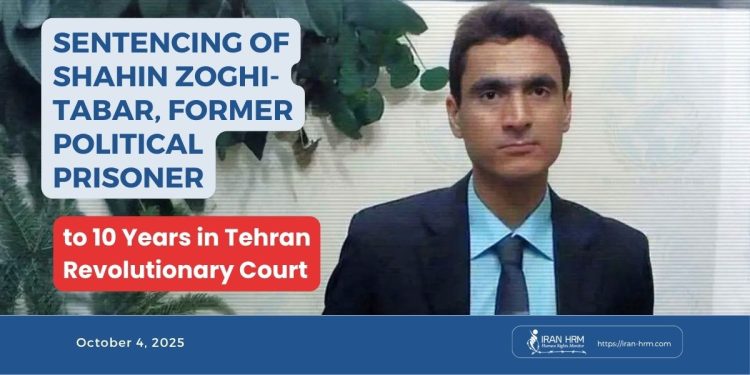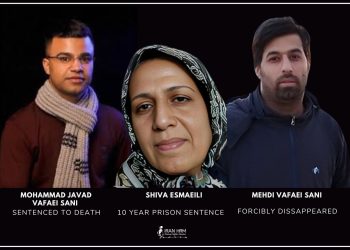Shahin Zoghi-Tabar, a 38-year-old political prisoner, has been sentenced to 10 years in prison by Tehran’s Revolutionary Court following his arrest in August 2025. His politically motivated charges and the inhumane conditions of detention once again highlight systematic human rights violations against political prisoners in Iran.
Violent Arrest Without Judicial Warrant
At dawn on August 2, 2025, security forces affiliated with the IRGC stormed the home of Shahin Zoghi-Tabar in Tehran’s Briank district. He was violently detained in front of his family, while his mobile phone, laptop, and personal documents were confiscated. The arrest was carried out without a judicial warrant and was accompanied by threats and verbal abuse, underscoring the extrajudicial nature of the case from the outset.
Heavy Sentence and Unfair Trial
On August 17, 2025, Zoghi-Tabar was tried at Branch 26 of the Tehran Revolutionary Court, presided over by Judge Iman Afshari. He faced charges of “assembly and collusion against the regime,” “membership and support of the People’s Mojahedin Organization of Iran (MEK),” and “propaganda against the regime.” Based on these charges, he was sentenced to a total of 10 years in prison. Reports confirm that the trial lacked transparency and that he was denied free access to legal counsel.
Prison Conditions and Health Crisis
After his arrest, Zoghi-Tabar was first transferred to Fashafuyeh Prison, notorious for overcrowding and unsanitary conditions. There, he developed severe kidney problems and swelling in his legs. Later, he was transferred to Ward 7 of Evin Prison, but his access to medical treatment remains limited and inadequate.
According to informed sources, Ward 7 suffers from poor-quality food, insufficient sanitary facilities, and repeated power cuts, which add psychological pressure on inmates. Prisoners must purchase hygiene products at excessively high prices from the prison store. His family has repeatedly expressed concern about his deteriorating health and lack of medical care.
Previous Imprisonment and Political Resistance
Zoghi-Tabar was first arrested in 2013 on charges of “insulting Khamenei” and sentenced to six years in prison. He served four years in Evin and Gohardasht prisons before being released on February 7, 2018. During that time, he was repeatedly placed in solitary confinement for protesting prison conditions and defending the rights of fellow inmates.
Former cellmates recall him as outspoken and resilient in the face of repression.
This history of resistance and advocacy for prisoners’ rights has made him once again a target of political repression, resulting in the new heavy sentence.
Human Rights Dimensions of the Case
The case of Shahin Zoghi-Tabar reflects the regime’s continued use of the judiciary as a tool of political suppression. His violent arrest, denial of access to a lawyer, and inhumane detention conditions constitute violations of Iran’s binding international obligations. Under the Universal Declaration of Human Rights and the International Covenant on Civil and Political Rights (ICCPR), these actions violate Article 9 (prohibition of arbitrary detention), Article 14 (right to a fair trial), and Article 7 (prohibition of torture and cruel, inhuman or degrading treatment).
Call for International Action
Human rights defenders stress that only international pressure and systematic documentation can prevent the repetition of such heavy sentences. The international community is urged to take immediate action regarding Zoghi-Tabar’s critical health condition and unlawful imprisonment.







